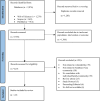Malaria and determinants of health: a scoping review of malaria vulnerabilities in Southeast Asia
- PMID: 40760710
- PMCID: PMC12323273
- DOI: 10.1186/s41182-025-00784-8
Malaria and determinants of health: a scoping review of malaria vulnerabilities in Southeast Asia
Abstract
Introduction: Malaria continues to pose a considerable public health challenge in Southeast Asia, necessitating control efforts that consider region-specific vulnerabilities. Although global risk factors are well-documented, the interplay of social determinants of health in shaping malaria vulnerability within SEA populations is less thoroughly explored.
Objective: This scoping review aims to determine elements influencing vulnerabilities towards malaria in SEA populations. In addition, this study seeks to explore how various social determinants of health contribute to the increased malaria vulnerabilities in this region.
Method: This review adhered to the PRISMA-ScR guidelines. A systematic literature search was performed in PubMed, Scopus, and Web of Science from October to November 2024, focusing on peer-reviewed, open-access quantitative studies published from 2014 to 2024. Studies that addressed the risk or vulnerability of malaria in SEA populations were included. Multiple reviewers independently conducted screening, data charting, and thematic synthesis.
Result: Twenty-two studies met the inclusion criteria, encompassing various malaria-endemic settings in SEA, including cross-border regions and migrant populations. The findings were synthesized using a social determinants of health lens, resulting in five thematic domains: biological influences, demographic and socioeconomic parameters, built and lived environments, behaviour and practices, and access to healthcare services and information.
Conclusion: The vulnerability of SEA population to malaria is multifaceted and deeply entrenched in a web of complex, interrelated factors. Effective control requires region-specific, multi-sectoral strategies that address these vulnerabilities through targeted interventions, strengthened health systems, and equitable public health policies.
Keywords: Determinant of health; Health inequities; Malaria; Risk; Vulnerabilities.
© 2025. The Author(s).
Conflict of interest statement
Declarations. Ethics approval and consent to participate: Not applicable. Consent for publication: All authors have given their consent for publication. Competing interests: The authors declare no competing interests.
Similar articles
-
Quality indicators for substance use disorder care: a scoping review protocol.BMJ Open. 2025 Mar 29;15(3):e085216. doi: 10.1136/bmjopen-2024-085216. BMJ Open. 2025. PMID: 40157735 Free PMC article.
-
Factors that influence caregivers' and adolescents' views and practices regarding human papillomavirus (HPV) vaccination for adolescents: a qualitative evidence synthesis.Cochrane Database Syst Rev. 2025 Apr 15;4(4):CD013430. doi: 10.1002/14651858.CD013430.pub2. Cochrane Database Syst Rev. 2025. PMID: 40232221 Free PMC article.
-
Health professionals' experience of teamwork education in acute hospital settings: a systematic review of qualitative literature.JBI Database System Rev Implement Rep. 2016 Apr;14(4):96-137. doi: 10.11124/JBISRIR-2016-1843. JBI Database System Rev Implement Rep. 2016. PMID: 27532314
-
Global Communication Practices and Their Impact on Patient Caregivers' Satisfaction in the Surgical Waiting Area: A Scoping Review.Healthcare (Basel). 2025 Jun 12;13(12):1408. doi: 10.3390/healthcare13121408. Healthcare (Basel). 2025. PMID: 40565437 Free PMC article. Review.
-
A scoping review of community knowledge in malaria prevention and control programmes.PLoS One. 2025 Jul 21;20(7):e0328703. doi: 10.1371/journal.pone.0328703. eCollection 2025. PLoS One. 2025. PMID: 40690438 Free PMC article.
References
-
- World Health Organization, editor WHO malaria policy advisory group meeting Report; 2023.
-
- Venkatesan P. The 2023 WHO world malaria report. Lancet Microbe. 2024;5(3): e214. - PubMed
-
- World Health Organization. World malaria report 2023. World Health Organization; 2023.
Publication types
LinkOut - more resources
Full Text Sources
Miscellaneous

